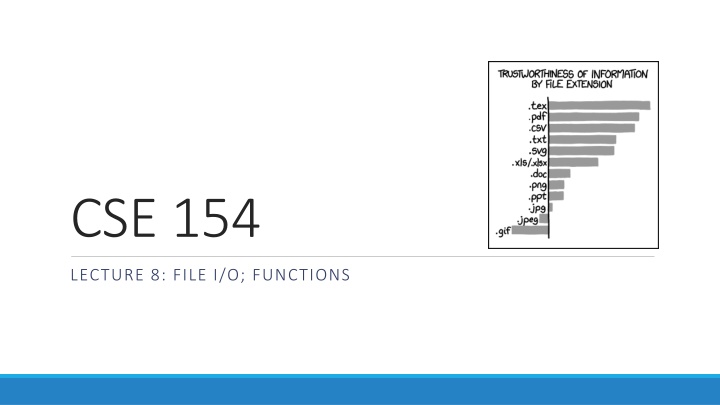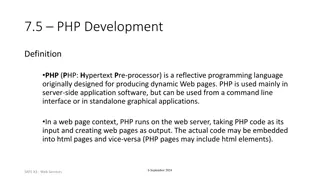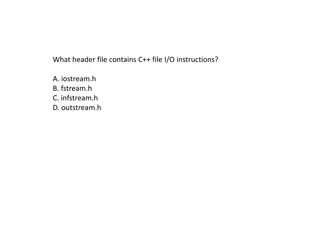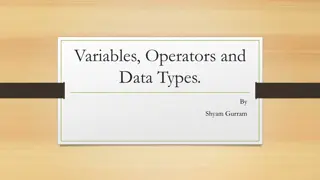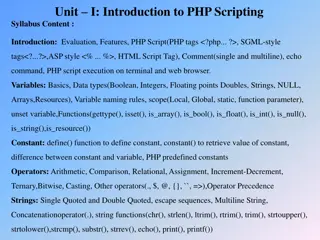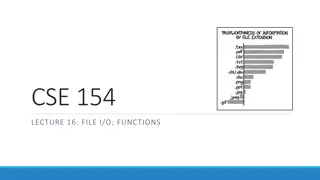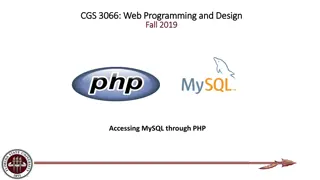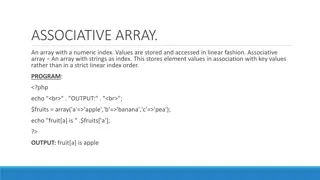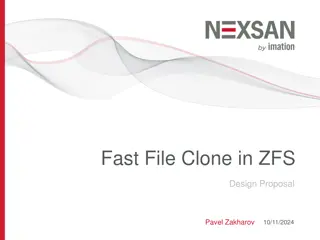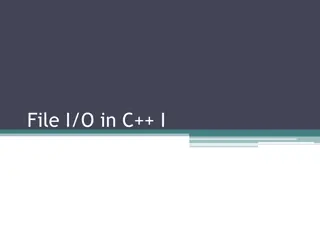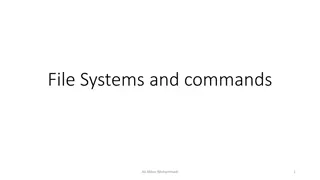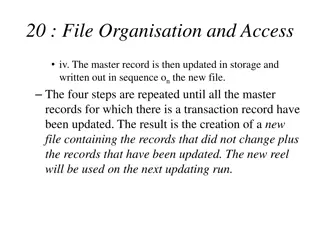PHP Functions and File I/O Basics
In this content, you will learn about PHP functions, including how to define functions, handle parameters, and return values. Additionally, you'll explore file input/output operations such as reading, writing, and manipulating files in PHP. Understand global and local variable scopes and default parameter values in functions. Discover key PHP file I/O functions for file handling, such as file_exist, file_put_contents, and more.
Download Presentation

Please find below an Image/Link to download the presentation.
The content on the website is provided AS IS for your information and personal use only. It may not be sold, licensed, or shared on other websites without obtaining consent from the author.If you encounter any issues during the download, it is possible that the publisher has removed the file from their server.
You are allowed to download the files provided on this website for personal or commercial use, subject to the condition that they are used lawfully. All files are the property of their respective owners.
The content on the website is provided AS IS for your information and personal use only. It may not be sold, licensed, or shared on other websites without obtaining consent from the author.
E N D
Presentation Transcript
CSE 154 LECTURE 8: FILE I/O; FUNCTIONS
Functions function name(parameterName, ..., parameterName) { statements; } PHP function bmi($weight, $height) { $result = 703 * $weight / $height / $height; return $result; } PHP parameter types and return types are not written a function with no return statements is implicitly "void" can be declared in any PHP block, at start/end/middle of code
Calling functions name(expression, ..., expression); PHP $w = 163; # pounds $h = 70; # inches $my_bmi = bmi($w, $h); PHP if the wrong number of parameters are passed, it's an error
Variable scope: global and local vars $school = "UW"; # global ... function downgrade() { global $school; $suffix = "(Wisconsin)"; # local $school = "$school $suffix"; print "$school\n"; } PHP variables declared in a function are local to that function; others are global if a function wants to use a global variable, it must have a global statement but don't abuse this; mostly you should use parameters
Default parameter values function name(parameterName = value, ..., parameterName = value) { statements; } PHP function print_separated($str, $separator = ", ") { if (strlen($str) > 0) { print $str[0]; for ($i = 1; $i < strlen($str); $i++) { print $separator . $str[$i]; } } } PHP print_separated("hello"); # h, e, l, l, o print_separated("hello", "-"); # h-e-l-l-o PHP if no value is passed, the default will be used (defaults must come last)
PHP file I/O functions function name(s) file, file_get_contents, file_put_contents basename, file_exists, filesize, fileperms, filemtime, is_dir, is_readable, is_writable, disk_free_space copy, rename, unlink, chmod, chgrp, chown, mkdir, rmdir glob, scandir category reading/writing entire files asking for information manipulating files and directories reading directories
Reading/writing files contents of foo.txt Hello how r u? file("foo.txt") array( "Hello\n", # 0 "how r u?\n", # 1 "\n", # 2 "I'm fine\n" # 3 ) file_get_contents("foo.txt") "Hello\n how r u?\n # a single \n # string I'm fine\n" I'm fine file function returns lines of a file as an array (\n at end of each) file_get_contents returns entire contents of a file as a single string file_put_contents writes a string into a file
The file function # display lines of file as a bulleted list $lines = file("todolist.txt"); foreach ($lines as $line) { # for ($i = 0; $i < count($lines); $i++) print $line; } PHP file returns the lines of a file as an array of strings each ends with \n ; to strip it, use an optional second parameter: $lines = file("todolist.txt", FILE_IGNORE_NEW_LINES); PHP common idiom: foreach or for loop over lines of file
Splitting/joining strings $array = explode(delimiter, string); $string = implode(delimiter, array); PHP $s = "CSE 190 M"; $a = explode(" ", $s); # ("CSE", "190", "M") $s2 = implode("...", $a); # "CSE...190...M PHP explode and implode convert between strings and arrays for more complex string splitting, you can use regular expressions (later)
Example with explode Martin D Stepp Jessica K Miller Victoria R Kirst contents of input file names.txt foreach (file("names.txt") as $name) { $tokens = explode(" ", $name); ?> <p> author: <?= $tokens[2] ?>, <?= $tokens[0] ?> </p> <?php } author: Stepp, Marty author: Miller, Jessica author: Kirst, Victoria output
Unpacking an array: list list($var1, ..., $varN) = array; PHP Allison Obourn (206) 685 2181 570-86-7326 contents of input file personal.txt list($name, $phone, $ssn) = file("personal.txt"); ... list($area_code, $prefix, $suffix) = explode(" ", $phone); PHP the odd list function "unpacks" an array into a set of variables you declare when you know a file or line's exact length/format, use file and list to unpack it
Reading directories function description glob returns an array of all file names that match a given pattern (returns a file path and name, such as "foo/bar/myfile.txt") scandir returns an array of all file names in a given directory (returns just the file names, such as "myfile.txt") glob can accept a general path with the * wildcard character (more powerful)
glob example # reverse all poems in the poetry directory $poems = glob("poetry/poem*.dat"); foreach ($poems as $poemfile) { $text = file_get_contents($poemfile); file_put_contents($poemfile, strrev($text)); print "I just reversed " . basename($poemfile) . "\n"; } PHP glob can match a "wildcard" path with the * character glob("foo/bar/*.doc") returns all .doc files in the foo/bar subdirectory glob("food*") returns all files whose names begin with "food" the basename function strips any leading directory from a file path basename("foo/bar/baz.txt") returns "baz.txt"
scandir example <ul> <?php foreach (scandir("taxes/old") as $filename) { ?> <li>I found a file: <?= $filename ?></li> <?php } ?> </ul> PHP . .. 2007_w2.pdf 2006_1099.doc output scandir includes current directory (".") and parent ("..") in the array don't need basename with scandir; returns file names only without directory
Reading/writing an entire file # reverse a file $text = file_get_contents("poem.txt"); $text = strrev($text); file_put_contents("poem.txt", $text); PHP file_get_contents returns entire contents of a file as a string if the file doesn't exist, you will get a warning and an empty return string file_put_contents writes a string into a file, replacing its old contents if the file doesn't exist, it will be created
Appending to a file # add a line to a file $new_text = "P.S. ILY, GTG TTYL!~"; file_put_contents("poem.txt", $new_text, FILE_APPEND); PHP old contents Roses are red, Violets are blue. All my base, Are belong to you. new contents Roses are red, Violets are blue. All my base, Are belong to you. P.S. ILY, GTG TTYL!~ file_put_contents can be called with an optional third parameter to append (add to the end) rather than overwrite
